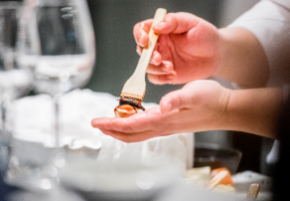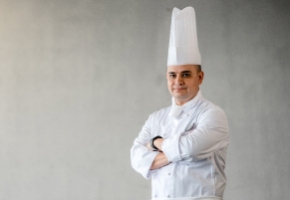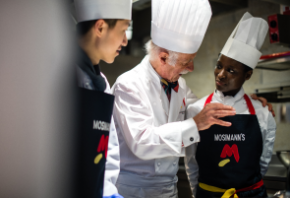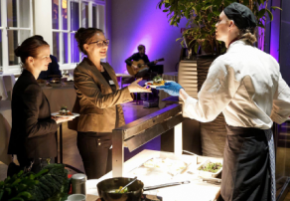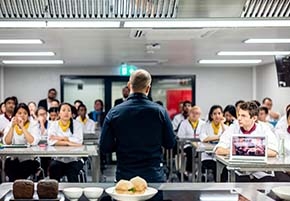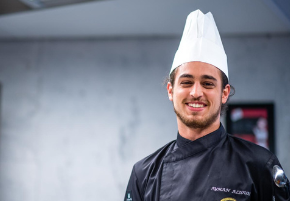- About
- Programs
- Campus Life
- Career Services
- Admissions
- News & Events
- Alumni
How Long Is Culinary School? Explore Program Duration
Find out how long culinary school is! Explore the duration of different culinary programs and discover which option is best for your future career in cooking.
Key Takeaways
- Culinary education equips professionals with technical skills, food safety knowledge, and business expertise.
- Programs vary in length based on the level of education and training they provide.
- A culinary education opens doors to various careers, including chefs, pastry artists, and restaurant managers.
Culinary education unlocks a world of endless creativity and culinary skills for those interested in the food industry. The culinary programs at Culinary Arts Academy Switzerland (CAAS) go beyond teaching the basics of cooking—they immerse students in a blend of hands-on techniques, food safety essentials, artistic expression, service, and business savvy.
Whether you dream of becoming a renowned chef, a master pastry artist, or a restaurant manager, culinary education offers a clear roadmap to sharpen your skills and fuel your career in the industry.
Culinary School Timelines by Program Type
Culinary programs vary in length and depth, offering options from short-term certifications to full-degree programs that align with different career goals and schedules. Whether aiming for a quick industry entry or pursuing leadership roles, students can choose the right path based on their aspirations.
Here’s a breakdown of the various programs available, their benefits, and the opportunities they open up in the dynamic world of culinary arts.
Certificate and diploma programs
Certificate and diploma programs in culinary arts can last from three months to one year, providing a quicker route into the industry. These programs are ideal for those seeking intensive, hands-on training without committing to a full-time degree.
At CAAS, even if you decide to pursue a bachelor's degree, you will earn certificates for each completed semester, allowing you to build recognized qualifications throughout your studies while progressing toward your degree.
CAAS students can choose from three specialized programs tailored to different culinary interests.
- Swiss Diploma in Culinary Arts: This one-year program focuses on mastering fundamental and advanced cooking techniques, covering international cuisine, kitchen operations, and menu development.
- Swiss Diploma in Pastry Arts: Designed for those passionate about baking and pastry, this program offers in-depth training in artisan bread making, chocolate work, and plated desserts in just one year.
- Swiss Certificate in Vegetarian and Plant-Based Culinary Arts: This 11-week program explores sustainable and innovative cooking methods, emphasizing nutrition, alternative proteins, and plant-based gastronomy.
With small class sizes, expert faculty, state-of-the-art kitchens, and access to top-tier industry internships, students gain practical knowledge in food safety, plating, presentation, and culinary business management. These programs serve as a strong foundation for entry-level roles or further education in the culinary field.
Associate degree in culinary arts
An associate degree in culinary arts typically takes around two years to complete and offers a well-rounded education that combines practical culinary courses with foundational knowledge in kitchen management, nutrition, and food safety. It prepares students for a quick entry into the culinary world while serving as a stepping stone for academic and professional growth.
Unlike a certificate program, which focuses on hands-on experience and specific cooking skills, an associate degree covers a broader curriculum, including business fundamentals, hospitality operations, and culinary principles.
Graduates with such a degree can pursue entry-level positions like line cooks, pastry assistants, or kitchen supervisors in restaurants, hotels, catering businesses, or other establishments. With experience, they can advance to positions like sous chefs or food service supervisors.
An associate degree can lead to further education opportunities, including a bachelor’s degree in culinary management or specialized certifications in pastry arts, food service management, or hospitality leadership.
Bachelor’s degree in culinary arts
The Bachelor’s degree in Culinary Arts at CAAS is a three-year program that combines advanced culinary techniques with business, hospitality, and leadership skills. In addition to technical cooking skills, students gain expertise in restaurant management, food science, marketing, and entrepreneurship. The program prepares them to create and present dishes, manage teams, develop business strategies, and oversee food service operations.
At CAAS, students also delve into gastronomy, sustainable food production, branding strategies, and financial planning for culinary businesses. Hands-on experience is a key component, with students completing internships at prestigious restaurants and hospitality establishments.
For example, CAAS graduate Hanna Johansson completed an internship with Mosimann’s Party Service, where she catered for Prince Charles. Reflecting on the opportunity, she shared:
I met Mr. Phillip Mosimann at the International Recruitment Forum in March 2017. I gave him my CV, and he took the time to ask me some questions. On the spot, he told me that he would like to offer me a position at Mosimann’s.
She further stated,
Still to this day, when I stop and think about it, I’m amazed. I did that, I went there and served those people! Wow!
Throughout the program, students develop leadership and management skills while deepening their understanding of kitchen operations and restaurant management. The curriculum includes courses in financial planning, marketing strategies, and entrepreneurship within the food industry.
Graduates of this program are well-prepared for leadership roles like executive chef, food and beverage manager, culinary consultant, or restaurant owner. They can also work in food media, product development, or international marketing, making this degree an excellent foundation for those aiming to make a lasting impact in the global culinary industry.
Master’s degree and advanced culinary education
A master’s degree in culinary business management offers an advanced degree that includes culinary education with strong leadership and business skills. These programs prioritize high-level decision-making, financial management, marketing, and operations management within the food industry.
The Master of Arts in Culinary Business Management at CAAS is a specialized program designed for professionals looking to advance their careers in the culinary industry. This one-year program provides students with hands-on education and experience in culinary leadership and management.
The curriculum focuses on real-world applications, covering areas such as financial planning, restaurant concept development, supply chain management, and branding strategies. Students also gain valuable insights through industry projects, guest speakers, and access to advanced culinary facilities. Graduates are prepared to navigate the demands of the global marketplace.
One of the graduates from this program, Maryia, shared how her first internship experience impacted her career:
My first internship was my first step out of student life and into serious life. The experience taught me a lot about hospitality, operations, and teamwork, and how to work in a diverse cultural environment. Every single one of my experiences taught me so much and made me stronger.
The program is ideal for candidates who aspire to become entrepreneurs and open their own restaurant or food business, experienced chefs who want executive roles, and hospitality professionals who aim to specialize in culinary business management.
Other Culinary Education Paths
After finishing a culinary degree, aspiring chefs and professionals can further build their skills through apprenticeships, internships, and specialized training programs. These opportunities offer hands-on experience in real-life kitchen environments, allowing graduates to develop their abilities and gain valuable industry exposure.
The duration of these paths can vary. Apprenticeships can last from a few months up to several years, while internships typically take anywhere from a few weeks to a year to complete. Specialized training programs, like workshops on pastry arts or international cuisines, can be short-term or more lengthy, depending on the focus. These opportunities complement formal education by providing practical experiences, networking opportunities, and mentorship from industry professionals.
CAAS gives students the opportunity to connect with top employers, internships, and job prospects worldwide through the International Recruitment Forum (IRF). Hosted by Swiss Education Group, this prestigious event connects students with over 100 leading recruiters from renowned hotel groups, luxury resorts, cruise lines, and hospitality businesses.
Through IRF, students have the opportunity to meet industry leaders such as Four Seasons, Mandarin Oriental, Marriott International, and The Ritz Paris. Beyond hotels, recruiters also include companies from catering, event management, retail, banking, and even the airline industry. These connections open doors to high-profile internships and full-time positions in some of the world’s most sought-after establishments.
Students can also have the chance to participate in various culinary competitions where they can test their limits. Maitha Warshaw, a student at CAAS, participated in the Jeunes Talents d’Escoffier competition as the first United Arab Emirates student. Reflecting on her experience, she shared,
I got the chance to create new dishes in an area of cuisine I had never cooked in before. I won second place in the end!
CAAS students also have the unique opportunity to learn from world-renowned chefs through the Distinguished Chef Series, where top culinary professionals share their expertise, techniques, and industry insights.
This exclusive series brings acclaimed chefs to campus, allowing students to engage in hands-on workshops, live demonstrations, and mentorship sessions with leaders in the culinary world.
Factors That Affect Culinary School Duration
The duration of a culinary degree depends on the study pace, type of institution, and program focus. Community colleges often provide two-year associate degrees, while specialized culinary institutions offer intensive curriculums that can be completed in months or years, depending on the depth and structure of the program.
Personal factors also influence program duration. Students with prior culinary experience may progress more quickly, while financial constraints can lead to breaks or part-time enrollment.
Internships and practical training can lengthen the duration of programs while offering essential industry knowledge, skills, and often a salary, which can offset school costs.
At CAAS, the duration of programs is structured while offering flexibility. Standard programs follow a set timeline, but students can extend their studies through internships or hands-on experiences. The academy works with top culinary schools to offer students career services and real-world experiences.
How to Choose the Right Culinary Program for Your Career Goals
Choosing the right culinary school can rely on your career aspirations, learning preferences, and long-term ambitions. Whether you want to be part of a Michelin-star restaurant, catering, or even have your own business, the right program should provide practical experience, strong mentorship, and industry connections.
Consider accreditations and affiliations, faculty expertise, and industry reputation when choosing a program. CAAS stands out with its Swiss-accredited education, world-class staff, and strong industry partnerships. The academy is the number one culinary arts institute in Switzerland and ranked eighth in the world for hospitality management.
At CAAS, students are trained in a high-performing environment in state-of-the-art facilities to prepare them for the demands of a professional kitchen. Malak, a graduate student, reflected on her experience at CAAS:
Looking back now, I especially appreciate the way the chefs taught us by putting us in high-pressure situations. They truly showed us how to survive in the real world.
It offers students access to elite internships, global networking opportunities, and career paths through the IRF. Understanding the expectations of IRF helps students make the most of these opportunities. These make CAAS an ideal choice for those seeking to fulfill their culinary dream career.
Your Culinary Career Starts Here
Culinary education provides various durations to align with different career objectives. Short-term diploma programs and certifications offer a quick entry into the industry. At the same time, associate and bachelor’s degrees can lead to higher leadership positions and provide a deeper understanding of culinary, management, and business skills. Apprenticeships, internships, and specialized training programs can further develop their skills and career advancement opportunities.
When choosing a program, it’s important to align it with your educational and career goals. Whether you want to become a chef, pastry artist, or restaurant owner, choosing the right career path can set you up for success.
At Culinary Arts Academy Switzerland, students gain world-class education, hands-on experience, and global partnerships to be more prepared for the industry. Choosing CAAS can lead to top culinary careers and educational opportunities.
Join us today and explore the culinary world one step at a time!
Frequently Asked Questions
Is a culinary degree worth it?
Yes, a culinary degree is worth it if you want more hands-on experience, network connections, and career advancement.
How long can it take to become a chef?
Becoming a chef can take a few years up to a decade, depending on the length of education, experience, and career goals.
Should you attend culinary school right after high school?
Attending culinary school right after high school is a great option, but some professionals also recommend gaining real-world kitchen experience before moving on to education
Interested in becoming a world-class chef? Learn more about Culinary Arts Academy Switzerland. Download our brochure.
